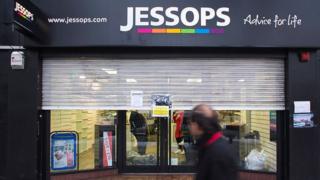Jessops owner plans to call in administrators

Image copyright
Getty Images
Peter Jones bought Jessops out of administration in 2013
Dragons Den star Peter Jones, who owns camera chain Jessops, plans to call in administrators to help secure the future of the High Street brand.
Mr Jones bought the chain from administrators in 2013 after it collapsed under £81m of debt.
While revenues have increased most years since then, profits fell to less than £10,000 last year.
Now Mr Jones reportedly plans to seek a rescue deal for the firm’s property arm, JR Prop Limited.
The division has reported a steep increase in rental costs since 2017.
- High Street: How many UK shops have closed?
- Empty shops hit highest level for four years
Now Mr Jones is reportedly planning to seek a rescue deal, known as a company voluntary agreement (CVA) with its landlords and lenders. This is an insolvency process that allows a business to reach an agreement with its creditors to pay off all or part of its debts and is often used as an opportunity to renegotiate rents.
Sky News said the CVA was expected to lead to store closures and rent cuts.
But sources close to Jessops, which employs around 500 people, said Mr Jones still saw a future in the business and would not say how many of the chain’s 46 stores were at risk of closure.
Media playback is unsupported on your device
Mr Jones bought Jessops in March 2013, just months after it had gone into administration and closed its 187 stores.
At the time, he said the chain would reopen some of its High Street shops to give it between 30 and 40 stores across the country.
He told the BBC that he wanted the price charged in store to be the same as online.
Asked then whether there really was a market for cameras that were not integrated into mobile phones, Mr Jones said: “The amateur photographer, you wouldn’t see them walking down the street taking that perfect picture with a mobile phone.”
But interest did not live up to his expectations.
He forecasted sales of at least £80m in the first year under his control. But he failed to turn around the group’s performance and the firm reported lacklustre turnover of £57.9m for the period.
However, in 2016, the firm’s revenues did reach £80.3m. The next year they surpassed £95m before dipping slightly amid tough trading conditions on the High Street.
The chain is the latest High Street brand to acknowledge tough trading conditions.
Last year, big chains such as Toys R Us, Maplin and Poundworld collapsed and vanished altogether.
Others such as Homebase, Mothercare, Carpetright and New Look did restructuring deals with their landlords, closing hundreds of shops between them.
Who is Peter Jones?
- The serial entrepreneur’s first venture was to start a tennis coaching school, after spending his summers working at a tennis academy run by his English teacher
- That gave him a taste for the world of business and, in his 20s, he started a computer business. That allowed him “a nice house, a BMW, a Porsche, and plenty of money to spend”, he later wrote
- But the good times didn’t last forever and the firm went under after a number of its biggest customers went bust, forcing Mr Jones to move back in with his parents aged 29. He went to work for Siemens UK and a year later was running its UK computer business
- But he didn’t remain an employee for long and in 1998, he started Phones International, which made him millions and earned him a seat as an investor on the BBC’s Dragon Den
- On the show, he invested a total of £4,085,667 in firms including Levi Roots, known for its Reggae Reggae Sauce.

